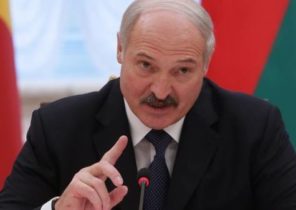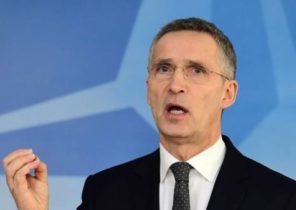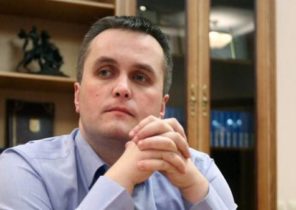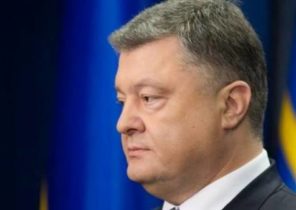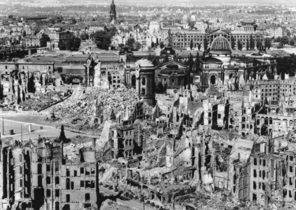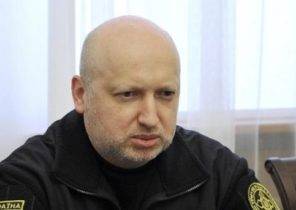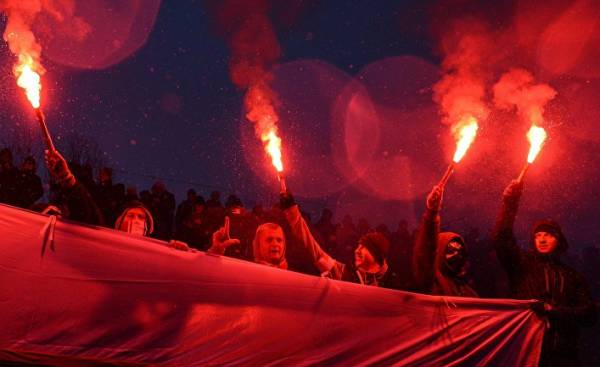
Polish press Agency (PAP): is it Possible on the background of the current international situation, to say that Russian politician threatened Poland?
Ernest Wyciszkiewicz (Ernest Wyciszkiewicz): In the last decade, Russia has been constantly engaged in that tried to weaken the position of Poland in the European Union and to undermine integration in the framework of the Alliance. The desire of Central European countries to strengthen the defensive potential of the region and associated with this the desire to increase the presence of NATO forces in Moscow saw the aggressive intentions of the West. If you recall the war with Georgia and the attack on the Ukraine, we can say that the Russian elite are projecting your desires on others.
The attempt to introduce a doctrine of limited sovereignty of its neighbors collapsed in the 1990s, when Russia failed to achieve a veto over NATO enlargement. Now this approach is openly used against post-Soviet countries and the Central European States Russia is trying to fuel the crises and internal tensions.
– At the same time it is trying to weaken Polish influence, and this, as I understand it, undermines the credibility of Warsaw in the international arena.
E.: Yes, it attempts to represent Poland country, Russophobia which is in the blood. This undermines its image as champion of the idea of an active policy of the EU towards its Eastern neighbours. After all, if someone is obsessed with a phobia, it’s clear that he’s not thinking rationally. This is the essence of this concept. Revealing how the Russian leadership responded, for example, the program “Eastern partnership”. On the one hand, it was ridiculed as a collection of empty statements, and on the other, especially after the Maidan and the Ukrainian society called for a European future for their country, it was called a geopolitical tool of the West, which not coincidentally has created the age-old Russian enemy — Poland.
I myself heard from the lips of some (fortunately remaining in the minority) of Western experts for the phrase: “If not the “Eastern partnership” (that is, the activity of Poland), there would be no story with the Crimea and everything that is connected with it”. Russian actions have sown in the minds of many Western politicians, no doubt, what is driving the poles: the common good, European interests, or their own phobias.
Russian actions in recent years (the occupation of Crimea and Donbass) had a beneficial effect in the sense that the West realized that the forecasts of Poland’s policy in respect to Russia was more accurate than the predictions of the overwhelming majority of Western politicians.
When we talk now with Germany, France or Britain policy towards Russia, we may differ in our proposals for solution of problems, but we believe the same diagnosis. The dialogue with Russia and about Russia, which led Poland, the interpretation of the motives that dictated the actions of the Kremlin, the debunking of false ideas such as “rapprochement through linkages” — all this was a new sound in the context of the Russian invasion of Ukraine. Policy hanging on poles label “Russophobes” failed, but this does not mean that Moscow refused from it.
Russian authorities continue to impose on city responsibility for the fact that relations between our countries have become so cool, and says that any kind of negotiations are possible only after we will go to unilateral concessions. In the language of the Russian foreign Ministry called it “a return to the pragmatic position in relation to Russia”. Meanwhile, the real pragmatism, of course, requires to uphold international law and the sovereignty of a neighbor who fell victim to aggression.
In this context, significant is the statement of the Russian foreign Ministry regarding the resumption of Polish-Russian group on difficult issues. Russia sees no prospects for cooperation…
Lukasz Adamski (Łukasz Adamski): Russia dilutes the meaning of the initiative. From the statement of the Russian foreign Ministry it is clear that Warsaw will receive a gift in the form of a resumption of dialogue on the theme of the story, but only if she’ll go for the normalization of political relations. In practice, this means that it should give up actions aimed at compliance with international law and strengthening security in the region, as well as support of democracy and the rule of law in post-Soviet countries. In addition, it should accept the Russian interpretation of the events of the Second world war and postwar Soviet domination over our country.
E. V.: at the same time the Russian military-historical society posted to the Katyn cemetery near the wagon, which was transporting Polish officers stand with false information about the Soviet prisoners in Polish camps in 1920. This is done under the unwritten law of symmetry of the crimes, which says that we can discard regrets about the atrocities that have been committed and repentance of our sins, finding the events that they will balance.
Serious Polish and Russian historians explained in their joint publication, what was the fate of these people, the myth of anti-Katyn long ago debunked, but apparently the authorities have found it a useful tool for such provocations as setting stands before the traditional visit to the Katyn families. It is despicable, but, unfortunately, does not cause surprise move. The statement of the Russian foreign Ministry regarding Polish-Russian group on difficult issues should be seen in this context. The response to the call for the resumption of serious historical inquiry become a historical provocations.
L. A.: I would suggest you compare the statements that the Russian foreign Ministry is doing after acts of vandalism against Soviet monuments on Polish and Czech territory. In the first case, in these texts it is emphasized that the desecration of monuments in Poland is the manifestation of the Polish Russophobia, actions, and considers himself unworthy of a civilized nation. These incidents are compared with the actions of ISIS (banned in Russia organization — approx. ed.) or the Taliban. In the Czech Republic, where recently desecrated the monument to the red army used a different approach. This is a minor incident, and the Russians understand that the Czechs are sympathetic to Russia and appreciate the merits of the USSR in the Second world war, says Moscow.
The Polish party condemns the acts of vandalism, and Russian — after every slightest incident in Poland, performs with emotional statements. It is difficult to get rid of the impression that hysteria is artificial, and it’s the same cynicism as the installation of the aforementioned stands in Katyn. It is a pity that the Russian authorities do not use their energy to perpetuate the memory of soldiers of the red army, which actually killed on the territory of Poland in 1941-42 in Nazi camps for prisoners of war killed 600 thousand people. They are in Russia is almost forgotten.
– Why is the event in the Czech Republic and in Poland, Russia reacts differently?
L. A.: Russia is trying to divide the States of the region on “pragmatic” and “hysterical”, that is obsessed with Russophobia. To the latter it considers Poland and the Baltic States. First, it tries to create a positive background of the relationship, and the second depicts almost exclusively in a negative light. This means that Moscow doesn’t hope in the near future to persuade the Polish authorities to take Russian requirements in the field of historical policy or foreign policy strategies. She just wants to convince the West that Poland is Russophobic, that is an irrational position.
We need to resist. The Polish government has different tools. One of them is the Polish-Russian centre for dialogue and accord, which has a mandate not only to negotiate with the Russians, but on the discussion of Russia, informing about it to the public in Poland and abroad, the formation in Russia of circles that will be customized to us kindly, and, finally, on the subject of the discussion with our foreign allies.
– In Poland, you can hear the opinion that Russia is trying to spoil Polish-Ukrainian relations, and uses this misinformation.
L. A.: Exactly, and this is now the main threat.
– How should in this case look Polish policy towards Ukraine? If the reaction of our foreign Ministry after the attack on the Consulate in Lutsk too harsh? In Poland “on the carpet” summoned the Ambassador of Ukraine, the Polish Consulate in the Ukrainian territory have suspended work.
E. Q.: note that this was actually a serious incident, and although, fortunately, no one was hurt, he had all the signs of the attack. Responsible for the security of such facilities lies with the state of the host, so the foreign Minister is obliged to demand an explanation from each country where something like this happens.
The Consulate temporarily closed because of security reasons. In addition, Warsaw was to send the Ukrainian side of the signal, due to the frequent attacks by “unknown assailants” diplomatic missions and other important for Polish-Ukrainian relations should be taken under special control. Carelessness may encourage criminals to continue the provocation.
L. A.: Warsaw tried to ensure that the Ukrainian authorities have tightened security measures. Analyzing the effects of the incident in Lutsk, you should consider other incidents, which, by design, were intended to drive a wedge between Poland and Ukraine. It all started with the destruction of Ukrainian monuments on Polish territory, then vandals desecrated the monument in Huta penyatskoy, in the village of Pidkamin in Lviv, at the cemetery in Bykivnia. Ukrainian monument desecrated also in Vienna, where the “unknown attackers” reminded of the Volyn massacre, with a very distinctive spelling errors, which never would have made a pole. Everything points to the fact that these acts of vandalism are not some Ukrainian nationalists and the gang acting on the orders of Russian structures.
To say for sure we can’t. In Poland they say that this could still be some Ukrainian nationalist groups.
L. A.: Absolute certainty we have, of course not, because criminals have not yet found but there are clues. First, we need to think about who benefits to spoil Polish-Ukrainian relations. Secondly, the Ukrainian nationalists (they are in Ukraine, of course, but their role we overestimate) believe that their enemy is not Poland, and Russia, which invaded their country. No sober Ukrainian patriot would open a new “front” by such attacks. Thirdly, the vandals make mistakes in the inscriptions in Ukrainian and in Polish.
E. V.: in addition, in Ukraine, no one tried to use these events to build your political capital. If it attacks the Ukrainians were immediately there would be some forces that would try to strengthen their own position. But nothing like this happens.
L. A.: But events immediately began to occur in Russia. In just a few hours after the bombing of the Consulate in Lutsk, the Chairman of the Duma Committee on international Affairs said that in 1943, Bandera killed the poles, and now began to shoot their grandchildren. Russian media and politicians immediately began to tell us about the blockade of the border crossing in Rava-Ruska, which gave people posing as poles.
– The Russian press always gets the information first…
E. V.: It was the most operational in all these incidents. This is another piece of evidence that points to a potential source of provocation, though of course direct evidence we have, and to get them to the investigating authorities of Poland and Ukraine have to coordinate their work.
– Notwithstanding all these provocations to keep the Polish-Ukrainian relations, which play a key role for our security?
L. A.: first, it is necessary ruthlessly to expose actions such as the attacks of vandals to the Polish and Ukrainian memorials, attack of the Consulate or demonstrations by people posing as poles. Then the provocations will not have such a strong effect, and, therefore, the risk of new decreases.
Secondly, it is important to maintain contact with the Polish and the Ukrainian public to avoid any misunderstanding. The vast majority of Ukrainians towards poles and friendly. Moreover, most people who look with sympathy to Poland and appreciate Polish culture, lives in the Western and Central part of Ukraine, in the East and South of this country they are much smaller.
I once demonstrated on the basis of surveys that, as paradoxical as it seems, a high level of sympathy for Bandera observed in those regions where a high level of sympathy for Poland. Ukrainian nationalism is anti-Polish sting.
We need a dialogue with Ukrainian society. We should explain, the best place in Kiev, from which comes the Polish attitude to the history of why it is necessary to solve the issue of the Volyn massacre and to recognize the responsibility of the Ukrainian insurgent army (banned in Russia organization — approx. ed.) and to dialogue on historical themes. In Poland quite rightly say that in Kiev you need to open the Polish historical Institute, which with the help of research and outreach activities will facilitate the conduct of historical dialogue, to weaken the degree of Polish-Ukrainian clashes on the basis of history and thereby not allow so easy to use them as a tool of pressure on us.
E. V.: one More important note: if you listen to the message that Poland addresses Russia, it is possible to detect a hint that you should separate the Russian-Ukrainian relations (i.e. war or, as the Russians call it, the crisis) from the Polish-Russian contacts. We are trying to convince that what is happening in Ukraine do not matter and are important only in the bilateral Polish-Russian problems, the solution of which we need to address.
We need to clearly emphasize that this is fundamentally contrary to the Polish national interests. This approach is harmful for two reasons. To abstract from the problem of the Russian invasion of Ukraine — it means to give the green light to the Russian desire to reshape the international architecture. Now it relies on international legislation and protects from the tyranny of the big powers small and medium-sized countries.
Moscow believes that the right of the strongest is more important than international law, and the sphere of influence of multilateral organizations equal to States. What this means for Poland to explain too. The fact that in recent years has made the Kremlin, will define Polish-Russian relations for many years forward, to ignore this fact is impossible. For the state of our mutual relations is in line with Moscow.
– We, however, including from politicians, we hear that Poland should not be afraid of Russia, and Ukraine.
L. A.: Politicians appeal to their constituents. We must admit that in Poland there is a certain group of people I called “Volyn reductionary”: they drive the topic of Ukraine Volyn massacre and point to the weakness of the Ukrainian elite who are not willing to draw a line under this crime.
The fact that such a group exists, fine. The task of the Ukrainian and Polish States to convince these people that Ukraine actually looks quite different from a policy of Warsaw against this country comes not from a blind ukrainophilism, and of our national interests.
These people need to be convinced. If the Ukrainians helped us, if they showed a willingness to make adjustments to their historical policy, we certainly would have been easier. For example, if Ukrainian elites recognize that in ethnic cleansing of poles in South-Eastern regions of the Second Polish Republic is responsible of the UPA, it will be easier to convince the Polish public that modern Ukrainians consider her first and foremost power that protected them from Sovietization.
– It is difficult to hope for the adjustment, because in Ukraine is dominated by the idea that the UPA actions were extremely heroic. The anti-Soviet resistance there acquired a larger scale than in Poland. It is difficult to reconcile this with the ethnic cleansing that claimed the lives of 100 000 Polish civilians…
L. A.: Historical memory in some way a construct, it can be changed with the help of the skillful actions of the people included in the dialogue. We need to effectively work on the poles and the Ukrainians, or Russia will long to play the Volyn massacre, as she is playing now the so called monuments of gratitude in Poland.
– We deal with the apparent memory conflict. Leading Polish politicians say that the UPA is anti-Polish organization. The Chairman of the party “law and Justice” (PiS) stated, for example, that in Europe there is no place for Ukraine with Bandera’s portrait on the banner.
E. V.: Why the poles and the Ukrainians will work, the results of which will be visible immediately. I hope here on the strength of dialogue. We have a network of contacts, so it should work. Need to organize more discussions, connecting them to the wider public, not just historians who know what happened and focus primarily on domestic destinations. Now very often, instead of analysing, we hear radical judgments, the authors of which want to win approval. Too little Polish researchers appears in the Ukrainian public debate and Vice versa.
L. A.: We know that in recent years thanks to the Polish-Ukrainian and internal discussions, the Ukrainians learned a lot about Volyn. The problem is that even if the Ukrainian elite are beginning to understand the depth of the problem, the intellectual field, the first violin continues to play historians who adhere to the nationalist interpretation of the events of the past. There is a tendency to relativize certain phenomena, for example, States that the Volyn massacre was, of course, but before that, poles were persecuted Ukrainians. This is the same mechanism by which the Kremlin reduces the significance of the Katyn crime.
Before the Polish state, society, historians have a major task, our political interests require to create a counterbalance to this discourse. We have to convince Ukrainians that the Polish approach to the Volyn massacre, which is best summed up by Professor Grzegorz Motyka (Grzegorz Motyka), comes not from a desire to impose his version of history, and based on scientific research. If the Ukrainians can accept it, it will be easier to function in the world and find allies.
The same strategy should elect Poland. I believe that in the twentieth century we, as a people, as a whole performed well, our history has many glorious moments, so would be politically right always and everywhere to lead by example the ability to reflect on their past. If we are able to judge (but, few) embarrassing incidents or crimes that are committed by the Polish army, to call a spade a spade, our neighbors, including fighting for the survival of Ukraine, it will be easier to deal with their complicated past. Maybe he wants to understand the Russians. Remember the words of Shuya Jozef (Józef Szujski): “fake story creates a false policy.”
